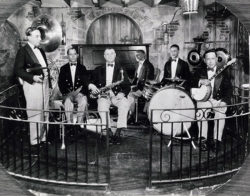Peter Bocage
Peter Bocage was a jazz musician active in brass bands and second line parades in the early twentieth century.

Courtesy of Tulane University, William Ransom Hogan Archive of New Orleans Jazz
Peter Bocage & his Creole Serenaders Orchestra. Newman, Dwight (Photographer)
As a legendary Creole musician from New Orleans, Peter Bocage was known for his ragtime, early jazz, and brass band performance career as a violinist, trumpeter, and multi-instrumentalist. A cousin to New Orleans rhythm and blues (R&B) musician Eddie Bo, Bocage performed with many stars of New Orleans jazz, including Joe “King” Oliver, A. J. Piron, Bunk Johnson, “Sweet” Emma Barrett, and the internationally famous Sidney Bechet and Louis Armstrong. Born into a musical family, Bocage followed in his father’s footsteps and began playing with his father’s band in the Storyville district and throughout New Orleans from an early age. Bocage composed “Mama’s Gone, Goodbye,” and his own group, the Creole Serenaders, were recorded by Riverside Records’ Living Legends series in the 1960s.
Bocage was born on July 31, 1887, to a prominent family in the Algiers neighborhood of New Orleans. His brothers, Charles (banjo, guitar, vocals) and Henry (tuba, string bass, trumpet) would both become noted jazz musicians, though they did not have the benefit of Peter’s more extensive musical training. Their father was a boat builder in Algiers and a well-known local guitarist. Bocage’s first instrument was the violin, for which he received lessons beginning at age thirteen. During his lifetime he would also become skilled on the mandolin, guitar, cornet, trumpet, banjo, baritone horn, xylophone, and trombone.
The year 1906 marked Bocage’s first public performance on violin with Tom Albert’s band. From about 1908 to 1910, Bocage was violinist and leader of the Superior Orchestra with Bunk Johnson and “Big Eye” Louis Nelson Delille. Until Storyville’s closure in 1917, Bocage played violin throughout the red-light district at such venues as the Tuxedo dance hall and Tom Anderson’s cabaret. In 1918 Bocage played with Fate Marable on the S.S. Capitol, a common gig for musicians of that era, as riverboats were a central source of entertainment for locals and tourists alike.
Bocage then embarked on a long musical collaboration with A. J. Piron, leader of a popular orchestra that included Lorenzo Tio Jr. and Louis Cottrell, among others. This ensemble toured New York in the mid-1920s and recorded with three record labels. Included in these influential sessions are a number of Bocage’s own compositions, including the hit “Mama’s Gone, Goodbye.” In the late 1920s, the group disbanded, leaving Bocage to reorganize and reassemble it as the Creole Serenaders, a band he would lead and with whom he would record many times over the coming decades.
Beginning in the late 1910s, Bocage had also become a regular player in brass bands throughout the city, including the Onward Brass Band with King Oliver, Henry Allen Sr.’s band, the Tuxedo Orchestra (which included Louis Armstrong), and the Excelsior Brass Band, for which Bocage took over for a time as leader. Despite his popularity on stage, Bocage still had to supplement his earnings from music with other jobs, and he worked in the insurance business in the 1930s. The 1940s saw gigs with Big Eye Louis Nelson and others. In spring 1945 Bocage played with Sidney Bechet in Boston, replacing Bunk Johnson briefly after he and Bechet had a falling out. In 1946 Bocage recorded with the Zenith Brass Band.
Bocage, along with his Creole Serenaders, became a fixture at New Orleans’s Preservation Hall after that French Quarter venue opened in 1961. That same year he recorded for the New Orleans Living Legends series as Peter Bocage with the Creole Serenaders & The Love-Jiles Ragtime Orchestra. During this time he also became a regular member of the Eureka Brass Band, with whom he would parade right before his death. In 1962 Bocage recorded with Eureka on the Atlantic record label. According to William Carter’s Preservation Hall: Music from the Heart, when asked by Sandra Jaffe, Preservation Hall’s proprietor, to play less violin, Bocage famously replied, “Who knows more about this music, you or me?”
Bocage died on December 3, 1967, in New Orleans.
